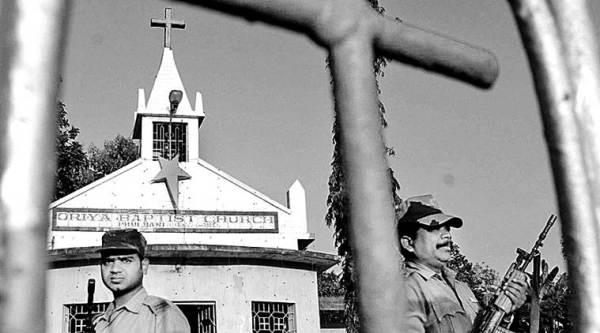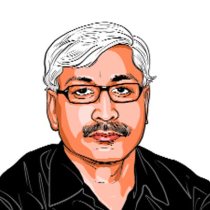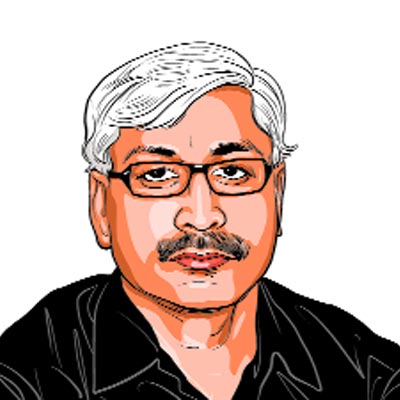Kandhamal without closure
A decade after anti-Christian violence took a toll, there are no signs of remorse

Security personnel stand guard outside a church during Christmas celebrations in Kandhamal. (PTI Photo/File)
Kandhamal is yet another milestone in the journey of independent India. It reminds us that we are moving towards the normalisation of a genocidal mindset. For the last 10 years, it is only the Christians who remember this atrocity. The majority community does not seem to feel the need to share the suffering, pain, humiliation and sense of injustice of their Christian compatriots. We are turning into a nation of fractured sensibilities with little sense of justice.
The archbishop of Cuttack-Bhubaneswar, John Barwa, has appealed for a holy mass on August 25, which marks the 10th anniversary of the anti-Christian violence in Kandhamal that led to the killing of more than 100 Christians, looting and burning and destruction of nearly 6,000 houses spread in more than 400 villages, desecration and destruction of hundreds of churches, convents, hostels and displacement of nearly 60,000 Christians from their homes.
The archbishop says this mass is an expression of the will of the people of Odisha to turn a new leaf and move towards a renewed society filled with peace and harmony, a move towards reconciliation and restoration of amity between communities. Recalling the horror of Kandhamal, which started on August 25, 2008, and continued for months, Archbishop Barwa hopes that “10 years ago, what happened in Kandhamal, Odisha should have never happened and should never ever happen again”.
If the victims themselves appeal for peace and there is no repentance or atonement on the part of the perpetrators, the talk of reconciliation becomes farcical. For the last 10 years, the Christians have been fighting a lonely battle for justice. Nearly all state organs, including the police and civil administration actively resisted and blocked the relief operations in the immediate aftermath of the attack. After that, they did everything to deny the crime, put the onus on the victims and obstructed their battle for justice.
Leave alone compensating the victims adequately and ensuring the return of the survivors, the government has not even acted on the 2016 order of the Supreme Court to re-investigate 315 cases of anti-Christian violence. The National Human Rights Commission has not opened its mouth on this violence. With criminals enjoying impunity, it is impossible to even think of reconciliation. Are the Christians expected to reconcile with this state-society apathy and stop demanding justice? Would it be called a return of peace then?
The mass violence against Christians in Kandhamal was preceded by a long and sustained hate campaign. Remember the murder of the Australian missionary Graham Staines and his two adolescent sons? This crime by members of the Bajrang Dal was legitimised, obliquely by a person like Atal Bihari Vajpayee, who called for a national debate on conversion after the killing. The Supreme Court gave a justification for the hate crime while lowering the quantum of punishment to the perpetrators. The court later expunged some of its controversial remarks on conversion following criticism from the civil society.
In the case of Kandhamal, it was the murder of Swami Lakshmanananda that acted as an excuse for and justification of the mass violence against the Christians. The Maoists claimed responsibility for the act but that did not deter the Vishwa Hindu Parishad and other leaders of the affiliates of the RSS from blaming the Christians and their organisations for his killing. Despite the Maoists’ claim, seven Christian tribals were sentenced to life and the appeal has not been heard by the high court in the last five years.
The action-reaction theory, invoked in 2002 in Gujarat to justify the genocidal violence against Muslims, was invoked in Kandhamal too. In Gujarat, the bodies of the people who died in the fire in the Sabarmati Express were taken out in a procession before the violence started. Similarly, the funeral procession of the Swami was allowed to be led by Pravin Togadia, who was shouting anti-Christian slogans and calling for revenge. Later, propaganda material from The India Foundation, whose many functionaries are now in the government, blamed Christians for the violence.
Ten years later, we need not recall the details of the violence. But we need to record the valiant battle that the victims and survivors have been engaged in to secure justice. This is despite the indifference, and stonewalling, of the state organs. These 10 years have seen hate and violence against Christians being routinised. Beating up of priests, breaking up of prayer meetings and carols, desecration of churches and arrests of priests, enactment of anti-conversion laws, as in Jharkhand or villages being made out of bounds for Christians as in Chhattisgarh, lack the spectacle of Kandhamal. Our indifference to all these only indicates the normalisation of what Kandhamal saw.
The writer teaches at Delhi University
For all the latest Opinion News, download Indian Express App
More From Apoorvanand
- Gandhi’s talisman for RahulCongress must remember: When in doubt, stand with the persecuted. ..
- For Whom The Bells TrollThe trolls that target Sushma Swaraj are a byproduct of her and her party’s politics..
- No Hope Of A DialogueOptimism over Pranab Mukherjee addressing RSS meet is misplaced..








































No hay comentarios:
Publicar un comentario